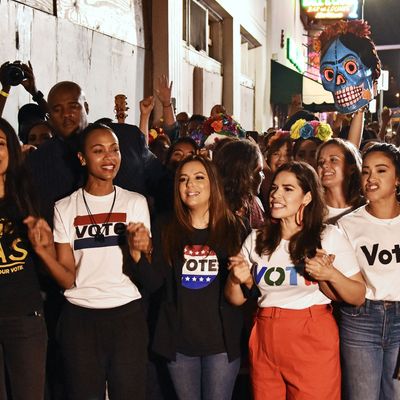
While there were a number of disappointments for Democrats in an otherwise outstanding 2018 midterm elections, perhaps the most surprisingly depressing were the two big statewide elections in the huge battleground state of Florida. In a review of his site’s generally accurate projections of the midterm vote, FiveThirtyEight’s Nate Silver listed 11 races in which all his models were wrong. The third and sixth most surprising were the Florida gubernatorial and Senate races; Nate’s models gave ultimate Republican winner Ron DeSantis and Rick Scott less than a 30 percent probability of victory. The final polling averages at RealClearPolitics were off by 4 percent in the governor’s race and 2.6 percent in the Senate race.
This outcome was especially disappointing for Democrats because the solidly favored Gillum could have broken up a Republican redistricting trifecta in a state with a large House delegation. And trends in Florida will matter a lot in 2020; it’s a state Donald Trump must carry if he is to win reelection.
It’s not too hard to find the smoking gun in Democratic underperformance in the Florida midterms. Exit poll showed Hillary Clinton winning 62 percent of the state’s large Latino vote in 2016. Losing 2014 Democratic gubernatorial candidate Charlie Crist won 58 percent. But this year, Nelson and Gillum each only won 54 percent. And that was in a national political environment in which Democrats took 69 percent of the Latino vote.
An in-depth exploration of that outcome at Politico magazine by Michael Grunwald and Marc Caputo cited evidence that the state’s traditionally conservative Cuban-American electorate — and the more conservative older voters among it — turned out at significantly higher rates than other Latinos. Not coincidentally, both Scott and DeSantis chose Cuban-American running mates, and benefited from the active support of Cuban-American senator Marco Rubio. Meanwhile Nelson and Gillum were hurt by a long-standing underinvestment in Democratic get-out-the-vote infrastructure in Democratic-leaning Latino communities (notably Central Florida’s enormous Puerto Rican population). And both Democrats had their own distinctive problems. Nelson’s were long-standing:
[B]y just about all accounts, [Nelson] ran a uniquely lazy campaign that made laughably ineffectual attempts to engage with Hispanics. Back in June, a POLITICO story quoted Florida Latinos warning that the three-term senator was virtually unknown in their communities after 40 years in elected office, and had no Spanish-language website or ads to fix that. By contrast, Scott campaigned relentlessly to reduce Nelson’s margins among non-Cuban Hispanics, especially the Puerto Ricans who were pouring into central Florida even before Hurricane Maria.
Gillum’s upset win in a very late (August 28) primary, based largely on a coalition of African-Americans and white progressives, gave him a late start in targeting Latino general-election voters. But there’s also evidence that Republicans exploited the communal fear of socialism among Cuban, Venezuelan, and Nicaraguan exiles by drawing attention to Gillum’s “democratic socialist” supporter Bernie Sanders and Gillum’s own “socialist” agenda and record as mayor of Tallahassee. Sanders and like-minded 2020 Democratic presidential candidates should take notice of that development if and when they head to the Sunshine State.
Ultimately Democrats understand they will likely never do as well among Florida’s Latinos as they do in states where Mexican-Americans are the principal Latino bloc. Long-established conservative political-refugee communities like the Cubans and native citizens like the Puerto Ricans are never going to be as sensitive to GOP anti-immigrant policies as Mexican-Americans. But the younger Cuban-American cohorts are much less wedded to their community’s built-in Republicanism than their elders. And Florida Latinos from every national background are attracted to Democratic economic, education, and health-care proposals.
In the context of 2020, having Trump on the ballot will be a problem for Republicans among Latinos, who can’t help but notice his white nationalist stylings, and who isn’t going to make the kind of effort Rick Scott and Ron DeSantis undertook to identify with the viewpoints of that portion of the electorate. Turnout should be up across the board. But Democrats are going to have to use some elbow grease and money, and effectively deploy surrogates, to achieve their potential among Florida Latinos. They probably can’t win without it.






























